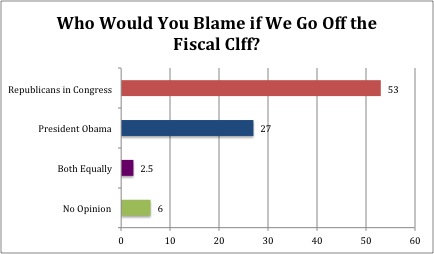Maybe eternal optimism dies hard after an election. But does anyone get the sense that the left is way less freaked out about the Fiscal Cliff than one ought to expect?
If that’s true, then it may be for good reason. The more I’ve read, the more I’ve become convinced that President Obama emerges from the Cliff negotiations on top.
Why? Returning to the left’s conspicuous non-hyperventilation as an ipso facto clue, the most adequate comparison in this social experiment would be to examine the end-of-the-world-as-we-know-it-ism from the Debt Ceiling negotiations, Obama’s first time around at high-wire negotiating. I think by most assessments—no matter whose feet at which you lay the blame—Obama let us down when the stakes were high.
But has the President gained the confidence and experience to nail it the second time around? If Obama strong-arms a winning deal on the Cliff, this will almost certainly fit into the trite narrative history concocts—Obama the Debt Ceiling Dilettante traverses into Fiscal Cliff Manhood (or, quite possibly, I have a weird mind).
But that version of Fiscal Cliff archetype is gaining speed, even already. Adding to the pressure is a media narrative that has begun to issue a peremptory prognosis that the final revenue number will fall around $1T.
It’s not all the media’s doing, of course, and the President does seem to have embraced elements of strategy markedly different from his approach to the Debt Ceiling fiasco; whether that means he has internalized some of the larger lessons from the Ceiling brouhaha doesn’t necessarily follow. But by way of evidence, consider a common criticism of the Debt Ceiling debate: that the President kept the argument within Washington, resorting to public pressure only at the tail end, and then only by asking citizens to call their legislators (“That’s your idea? Call your Congressman? Did the President just quit?”). This time around, the President has simply continued his November campaign, utilizing OFA to galvanize public support for marginal rate hikes from the outset. Shrewd.
What else is benefiting Obama at the table? Possibly the arcane details of the Cliff itself, unlike the “raising of the Debt Ceiling”—which by the very sound of the phrase lacked a clear justification for most uninformed voters, thus creating a major burden for the President’s side and allowing Republicans to irresponsibly pretend they were cool with miss the Ceiling deadline. This time around, truly nobody wants to go over the Fiscal Cliff (and if anybody, it’s Democrats who are considering taking the plunge—see our interviews with Howard Dean and Sheldon Whitehouse). But on the whole, if marginal rate hikes are a way to avoid the Cliff, it seems clear that Americans remain amenable to that outcome. In that sense, the argument for avoiding the cliff comes prepackaged with tax increases.
So, to compare the Ceiling and the Cliff: Yes, it’s true that Obama is likely more adept at the negotiating table; and he is simultaneously the clear beneficiary of post-electoral zeal that adds momentum to his argument. He may even benefit from the substantive details of the crisis.
But say those things weren’t true. Say the President was a terrible negotiator. Say he even lost the election. It’s still hard for me to see how Obama doesn’t come out on top, and that’s because of this poll:
Perhaps conditioned by the embarrassing and face-palming experience of the entirely avoidable Debt Ceiling—or, perhaps, because Americans are smarter than we give them credit for—Americans seem poised to blame Republicans for the outcome of the Cliff negotiations if and when the negotiations fail.
One could argue that Americans’ disposition to the Fiscal Cliff negotiations are a non-substantive afterglow of the election results, and have nothing to do with their true policy preferences; after all, a majority of Americans consistently say that they don’t like tax increases. That’s notwithstanding the vast majority that can’t identify who we fought during the Cold War, so to expect Americans to understand the intricate policy details of debt negotiations is perhaps asking one too large a walrus to dance the Macarena. (Instead of deleting this first-draft metaphor, I doubled-down and actually found this. You’re welcome).
I take the opposite stance. If anything, the Gallup results indicate that Americans keenly understand—if not the details themselves—the generality of what remained at stake last election: one side that wanted debt reduction through tax increases, and another that wanted the same goal predominantly through spending cuts.
Obama has a double-incentive to go over the Cliff: first, the automatic expiration of all tax cuts, allowing Democrats to re-introduce middle class tax cuts but filibuster any reduction in top marginal rates; and the pre-ordained consensus that it’s all the Republicans’ fault. Unless I’m missing something, Obama is holding a Royal Flush—and, in the words of Jon Stewart, Republicans are making the best of their “Sh*t Taco.”
I’m opening the floor; is there any scenario readers can see Obama losing?

